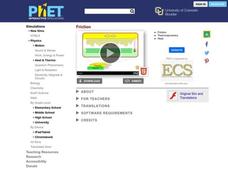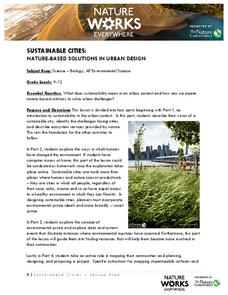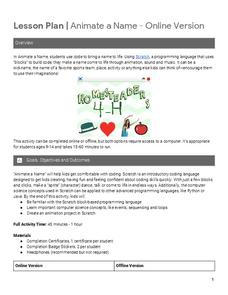PHET
Generator
Michael Faraday was self-educated, earned an honorary doctorate from the University of Oxford, invented the first Bunsen burner, discovered the laws of electrolysis, and proved that a changing magnetic field produces a current. In this...
PHET
Friction
Friction leads to movement, heat, and melting on such a small scale most people don't notice. A short simulation permits scholars to observe the reaction between atoms as they move together. The simulation applies the concept of...
PHET
Geometric Optics
What would happen if your entire world was flipped upside down? In addition to changing the distance and size of an object, lenses flip the image upside down. The simulation allows scholars to vary the object, move the object, move the...
Nature Works Everywhere
Sustainable Cities
Investigate aspects of sustainable cities and relate them to where you live! A detailed lesson first investigates the definition of sustainability. Learners then explore human impact on the environment and social justice. Their final...
Nature Works Everywhere
Fishing for a Future
Teaching a man to fish has an environmental impact. Through a series of four lessons, learners study the science of fishery management. Their study involves analyzing data to develop a management strategy for specific fish and common...
Amnesty International
Respect My Rights, Respect My Dignity: Module One – Poverty and Human Rights
Creating an environment where learners feel both educated and empowered challenges any teacher when discussing a sometimes bleak topic. A respectful resource provides them with the details and permits them to make a plan of action....
Swiss Agency for Development and Cooperation
Gender and Sport
Serena Williams, Mia Hamm, and Danica Patrick are living proof that women enjoy sports just as much as men. Sports enthusiasts read about the importance of gender equality on the playing field. They discover barriers to participation and...
Google
Animate a Name
What's in a name? Pupils use the Scratch code blocks to animate letters in a name. They learn about events, sequencing, and loops in computer science by taking part in the project.
Center for Technology in Teaching and Learning
CSI: The Experience - Family Forensics
Forensic scientists depend on their observation skills to analyze evidence down to the molecular level. Middle and high schoolers practice making observations and predictions with a series of crime scene activities, which includes a...
Township of Wilmot
Kindergarten: Exploring the Concept of “Leadership”
Kindergartners aren't too little to be leaders! Teach them about the qualities and responsibilities of all types of leaders, including political figures, community leaders, and family members, with an engaging lesson for young...
Canada's National Arts Center
Vivaldi and The Four Seasons
Did you know that Vivaldi’s orchestra was largely made up of girls from an orphanage? Fun facts like this fill a 34-page teacher's kit designed to accompany a cross-curricular study of Vivaldi's The Four Seasons.
Anne Frank House
Anne Frank House: The Secret Annex
A virtual tour of Amsterdam's Anne Frank House permits viewers to not only visit the Secret Annex but to also view photos and videos, examine a timeline of events, and learn about the fate of Anne Frank and her family.
PHET
Expression Exchange
Bank on your ability to write equivalent expressions. Scholars use an interactive to create expressions using coins. They then convert these to algebraic expressions and figure out how to evaluate them. A game with various difficulty...
Ashoka
A Toolkit for Promoting Empathy in Schools
Instill kindness with a unit all about empathy. Lessons and activities follow a prepare, engage, reflect, and action sequence. Learning experiences include making the classroom a safe environment, peer-invented handshakes, discussions...
Facing History and Ourselves
Why Little Things Are Big
Often our decisions are impacted by a fear of how others see us. That's the big idea in a two-day lesson that asks how false assumptions, how our fear of how others may see us, impact how we act. After watching a video about such a...
Facing History and Ourselves
Understanding Identity
Key to social-emotional learning is understanding who we are. The first lesson in an Understanding Identity unit asks class members to consider the factors that shape one's concept of themselves, the parts of their identity they choose...
Facing History and Ourselves
Speaking Up and Speaking Out
The final instructional activity in the Standing Up for Democracy unit offers class members a way they can stand up and speak out by crafting spoken word poetry, or Slam poetry. After analyzing several examples, individuals reflect on...
Facing History and Ourselves
Unit Assessment: From Identity to Action
Four projects enable class members to show what they have learned about ways they can stand up for democracy. to begin, individuals review their identity charts and craft a mask that represents themselves. Next, groups create a short,...
Facing History and Ourselves
Responding to Difference
James Berry's poem, "What Do We Do With a Difference?" launches a lesson that asks class members to consider the ways people respond when they encounter someone different from themselves. After analyzing the poem and discussing how they...
Facing History and Ourselves
Protesting Discrimination in Bristol
Using the Bristol Bus Boycott as a case study, class members examine the strategies and levels of power protesters used to effect change. The two-day activity concludes with individuals reflecting on the actions they might take in face...
Facing History and Ourselves
The Costs and Benefits of Belonging
Peer pressure and the desire for acceptance are powerful things. A thought-provoking lesson looks at the positive and negative effects of wanting to belong to a group. Class members examine the roles of the perpetrator, the victim, the...
Facing History and Ourselves
When Differences Matter
Jane Elliott's controversial blue eyes/brown eyes experiment detailed in the film A Class Divided leads to a discussion of privilege, social power, and opportunity. Viewers note how the children react to the experiment, share their...
Facing History and Ourselves
Blending In and Standing Out
An excerpt from Sarfraz Manzoor's memoir about how his experiences as a Pakistani growing up in England shaped the way he though about his identify provides a stimulus for a discussion of how experiences can shape our concept of identity...
Facing History and Ourselves
Making Rights Universal
Class members continue their discussion of Universal Declaration of Human Rights (UDHR). After examining an infographic the summarizes the document, groups examine four of the rights to decide if they are or are not universal, and if...
Other popular searches
- French Grammar Worksheets En
- Post En
- Phonics Endings En
- By Ens
- Stilling En
- En Ts
- Sending En
- Period En
- En Family Words
- Reggae en Espaâ¿â¿ol Plena
- Font En
- En El Restaurante























